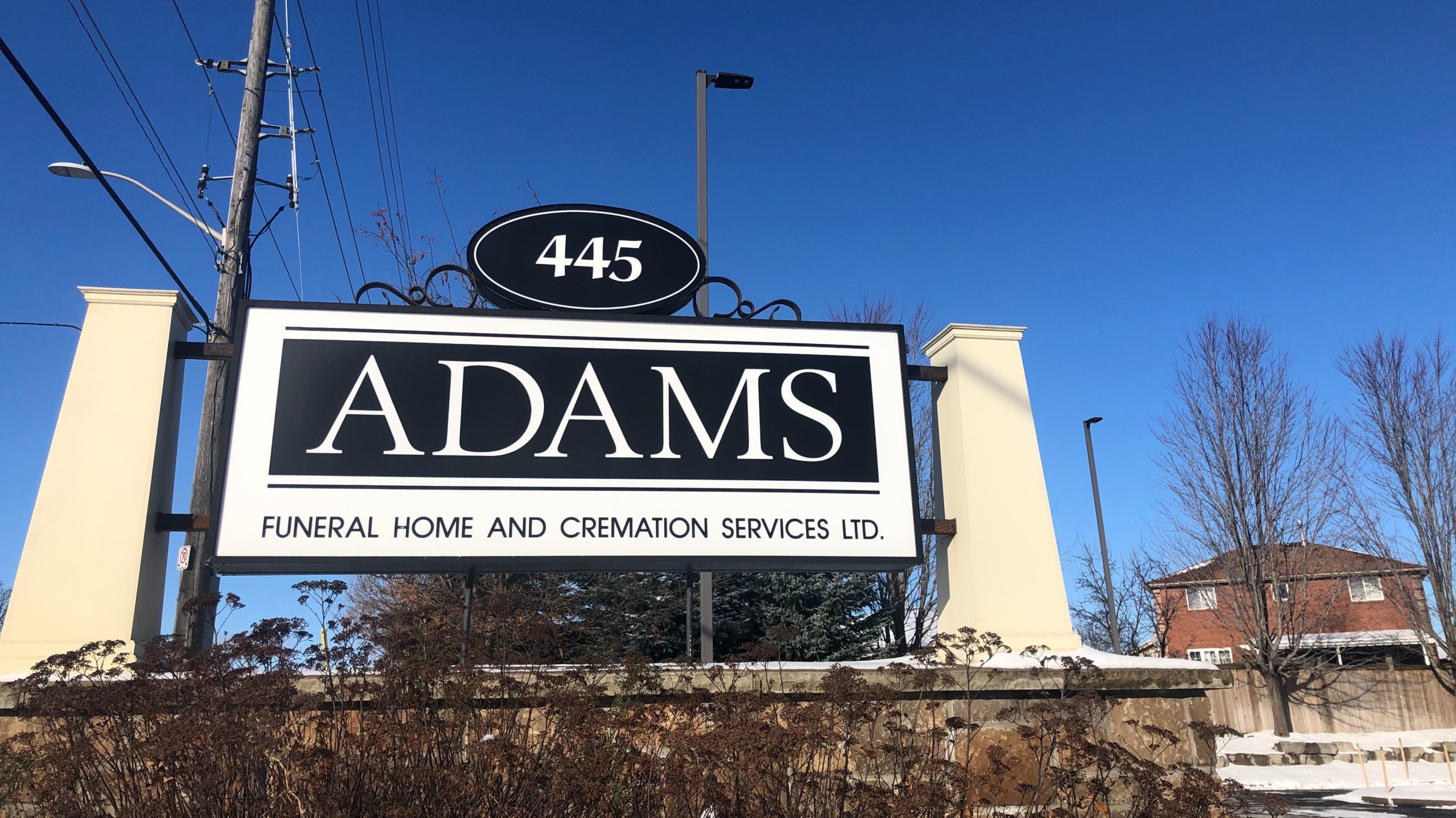Home is where the heart aches

caption
Adams Funeral Home.Hockey pucks. Bylaw officers. This is a strange time for funeral directors.
Coronavirus has changed the way we live; it has also changed death. Early in the pandemic era Doug Adams was preparing for his first drive-by funeral. A line of cars was snaking around the streets near the cemetery. The funeral was for a 14-year-old boy killed in a car crash. His family stood at the burial site awaiting the long procession.
Adams is the owner and director of the Adams Funeral home in Barrie, Ontario. Since the virus outbreak he’s been trying to help families find new ways to mourn.
Approximately 200 cars drove through the cemetery. Cars weren’t able to stop, and people could not get out. Adams describes the drive-by funeral as a sombre parade: cars moved slowly and quietly. Many people held homemade signs out their windows with messages like “we love you” and “you’ll always be remembered”; others blew kisses.
Adams has been a funeral director for 35 years. Normally, his primary role is supporting families. Now he also has to set up cameras to livestream services, disinfect throughout the funeral home and – most difficult of all – ensure that people stay six feet apart.
And he has to make all this feel normal.
To mark the distance between people, Adams uses a very Canadian emblem: bright orange hockey pucks.
Parked on a road outside the cemetery was a city bylaw officer with his window rolled down, watching the procession. Adams says this kind of observation is normal; a bylaw officer has been present for almost every burial. If Adams fails to enforce social distancing or allows a few too many people in the cemetery, he has to pay a heavy price: a $100,000 fine and a licence suspension.
Adams says this would mean having to shut down his business. “We have to be accountable,” he says. “There is too much for us to lose.”
With mourners on one side and the bylaw officer watchdog on the other, Adams is in the middle, trying to do his job the best he can.
He entered this profession to care for people going through a terrible time. “It’s like our role as the funeral director has changed into almost being the enforcer,” he says, “which I don’t like.”
Many funeral homes have added an extra fee to account for additional costs from COVID-19. Adams says he has not. At the end of the day, he says, it’s not always about the money. We are living through difficult times, so he is just trying to help people through.
Funeral home visitations are a stark indication of these challenging times. “Seeing a family where you know if they had a visitation, they would probably have 300 people in, and they end up with 20 on a rolling visitation,” he says, “you just don’t feel like you’re helping.”
A limited visitation was something Marnie Lye experienced when her father Martyn passed in April. Martyn died in a nursing home in Newmarket, Ontario. Lye says he was a fantastic guy, and a huge loss to his community.
“To really do my dad honour, we need a proper day to gather with 200 people,” Lye says. “I mean, that’s how many lives he touched.”
At the time of Martyn’s death, funeral homes had a 10-person limit. Lye has two sisters; including husbands and kids they are 15 people. The family had to separate themselves into two groups and hold two separate funerals.
On the day of the funeral Lye walked into the room and found the chairs all six feet apart. She immediately pulled them together into household groupings so that throughout the service she could lean on her husband.
Grieving brings us closer together than ever – emotionally and physically. When there are no words, a loving arm around someone’s shoulder, or a hug, can mean everything. Physical gestures are the language of grief.
Lye says mourning without physical touch feels “unnatural”, perhaps even “inhuman.”
“It’s like holding your breath,” she says, “and then being told that you can only exhale in short little bursts.”
Despite the restrictions, Lye did her best to make it feel normal – especially for her kids, who are 10 and 3.
After the service, Rock Lobster by the B-52’s – the song their grandfather loved to play for them – rang out over the sound system. The kids danced around the casket, celebrating in their own way. In the middle of all the restrictions and fear, a family was able to create their own ritual. Lye says the smaller funeral actually allowed for a more uncensored expression of love and grief.
Lye believes our humanity – our resilience and creativity – helps us find light even in the darkest of times. This is the same force that pushes Doug Adams to go to work every day and overcome his new challenges.
“It’s frustrating,” he says, “but I think we have to get over that and think about what we’re doing for other people.”
After the drive-by funeral, Adams says, the family told him how deeply moved they were by the outpouring of love and support. Moments like that remind Adams why he continues to do this vital work: to help people in the most difficult times.
Editor's Note
This article was reported and written in June and July 2020.
About the author
Ellen Riopelle
Ellen is a journalist currently living in Halifax. She has a penchant for travelling, hammocks, craft beer and good stories.
